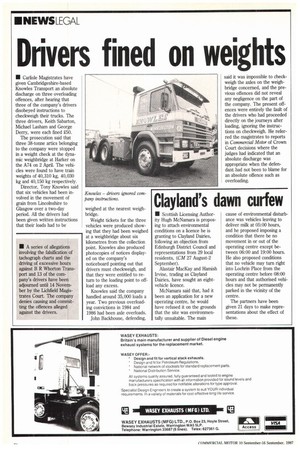Drivers fined on weights
Page 26

If you've noticed an error in this article please click here to report it so we can fix it.
• Carlisle Magistrates have given Cambridgeshire-based Knowles Transport an absolute discharge on three overloading offences, after hearing that three of the company's drivers disobeyed instructions to checkweigh their trucks. The three drivers, Keith Sabarton, Michael Lasham and George Derry, were each lined £50.
The prosecution said that three 38-tonne artics belonging to the company were stopped in a weight check at the dynamic weighbridge at Harker on the A74 on 2 April. The vehicles were found to have train weights of 40,310 kg, 40,030 kg and 40,150 kg respectively.
Director, Tony Knowles said that six vehicles had been involved in the movement of grain from Lincolnshire to Glasgow over a two-day period. All the drivers had been given written instructions that their loads had to be weighed at the nearest weighbridge.
Weight tickets for the three vehicles were produced showing that they had been weighed at a weighbridge about six kilometres from the collection point. Knowles also produced photocopies of notices displayed on the company's noticeboard pointing out that drivers must checkweigh, and that they were entitled to return to the loading point to offload any excess.
Knowles said the company handled around 35,000 loads a year. Two previous overloading convictions in 1984 and 1986 had been axle overloads.
John Backhouse, defending, said it was impossible to checkweigh the aides on the weighbridge concerned, and the previous offences did not reveal any negligence on the part of the company. The present offences were entirely the fault of the drivers who had proceeded directly on the journeys after loading, ignoring the instructions on checkweigh. He referred the magistrates to reports in Commercial Motor of Crown Court decisions where the judges had indicated that an absolute discharge was appropriate when the defendant had not been to blame for an absolute offence such as overloading.












































































































